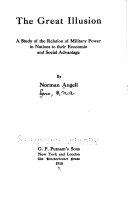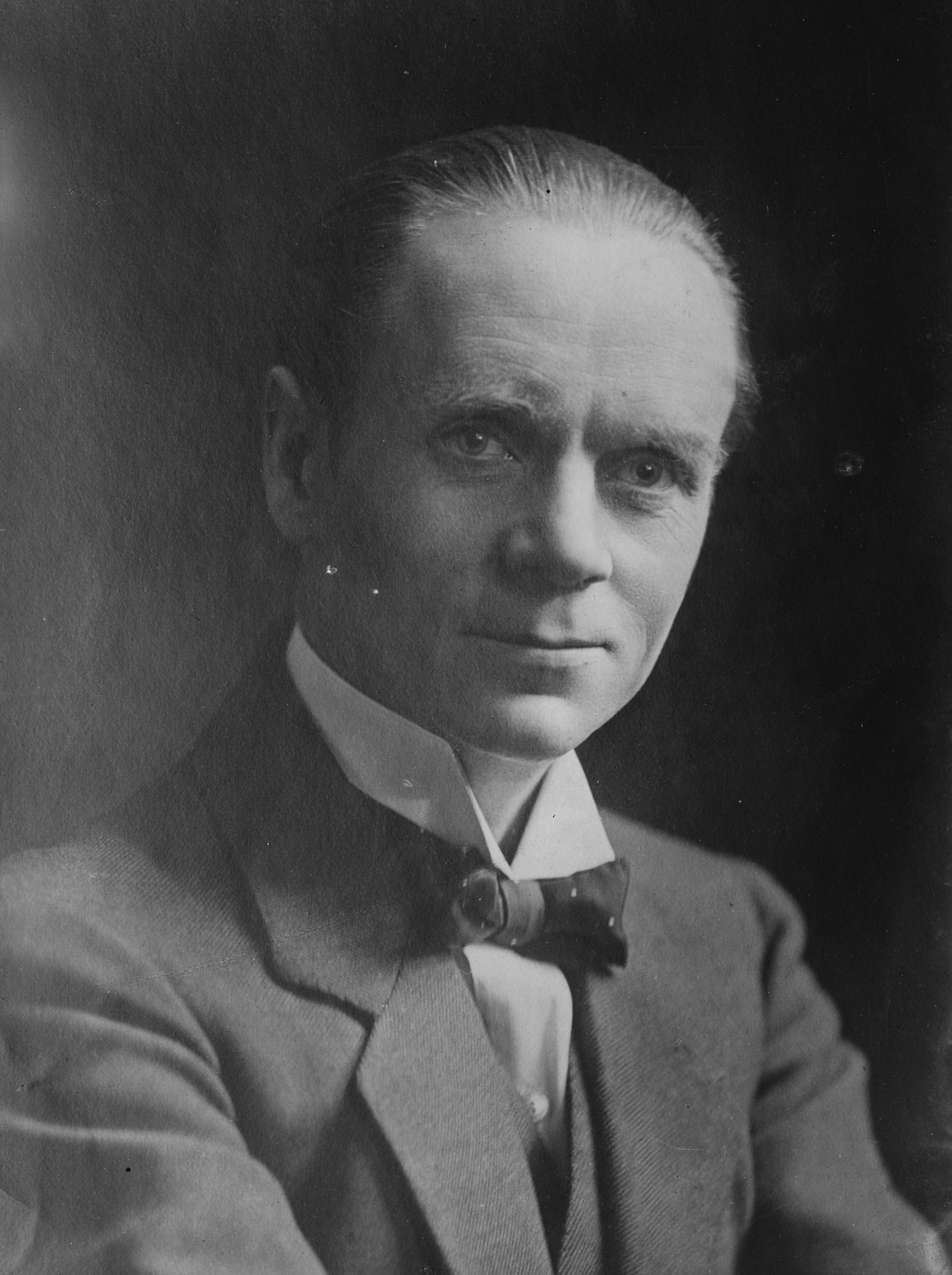Works

The Great Illusion
Norman AngellFamous Norman Angell Quotes
Peace and the Public Mind (1935)
The Great Illusion (1910)
Peace and the Public Mind (1935)
Peace and the Public Mind (1935)
Peace and the Public Mind (1935)
Norman Angell Quotes about war
But why do the millions obey?
Peace and the Public Mind (1935)
Peace and the Public Mind (1935)
The Union of Democratic Control (10 October 1916)
Peace and the Public Mind (1935)
Peace and the Public Mind (1935)
Context: Now, please don't misunderstand me. When I point out that all our wars for a thousand years have been fought in other people's countries, I do not mean that any of these wars was necessarily aggressive. They may well have been, everyone of them, defensive. But plainly they were not defensive of soil, territory. Of what then were they defensive? They were defensive of the nation's interests, rights; interests which may well collide with the interests of other nations in any part of the world... Nations do so differ as to what their respective rights are and differ sincerely. And often the question, which of the two is right, is extremely difficult, as anyone who has attempted to disentangle rival territorial claims in the Balkans or elsewhere knows only too well.
The Great Illusion (1910)
Norman Angell Quotes about men
The Great Illusion (1910)
The Great Illusion (1910)
Context: The elaborate financial interdependence of the modern world has grown up in spite of ourselves. Men are fundamentally just as disposed as they were at any time to take wealth that does not belong to them. But their relative interest in the matter has changed.
In very primitive conditions robbery is a moderately profitable enterprise. Where the rewards of labor are small and uncertain, and where all wealth is portable, the size of a man’s wealth depends a good deal on the size of his club and the agility with which he wields it. But to the man whose wealth so largely depends upon his credit, dishonesty has become as precarious and profitless as honest toil was in more primitive times. The instincts of the City man may at bottom be just as predatory as those of the robber baron, but taking property by force has been rendered impossible by the force of commercial events.
Peace and the Public Mind (1935)
Context: The fact that men are naturally quarrelsome is presumed to be an argument against such institutions as the League. But it is precisely the fact of the natural pugnacity of man that makes such institutions necessary. If men were naturally and easily capable of being their own judges, always able to see the other's case, never got into panics, never lost their heads, never lost their tempers and called it patriotism — why, then we should not want a League. But neither should we want in that case most of our national apparatus of government either — parliaments, congresses, courts, police, ten commandments. These are all means by which we deal with the unruly element in human nature.
Peace and the Public Mind (1935)
Context: The force which makes for war does not derive its strength from the interested motives of evil men; it derives its strength from the disinterested motives of good men. Pacifists have sometimes evaded that truth as making too great a concession to Mars, as seeming to imply (which it does not in fact) that in order to abolish war, men must cease to be noble.
Base motives are, of course, among those which make up the forces that produce war. Base motives are among those which get great cathedrals built and hospitals constructed-contractors' profit-seeking, the vested interests of doctors and clergy. But Europe has not been covered by cathedrals because contractors wanted to make money, or priests wanted jobs.
Peace and the Public Mind (1935)
Context: Before war can be fought, a long series of necessary steps, which quite obviously are not and cannot be enforced steps, must be taken by the mass of men. Naval and military budgets must be voted in parliaments and congresses, not just once or twice in a generation but year after year; not secretly, but accompanied by long and public discussion, the budgets being supported by members of parliament, or deputies or congressmen who are still in many states continuously reelected in free and secret franchises, often by great majorities.
Peace and the Public Mind (1935)
Norman Angell Quotes
Peace and the Public Mind (1935)
Context: The conception that we can only protect ourselves if we are prepared to protect others surely ought to belong to the nursery stage of social education.
But such things as the mechanism of security through law, the place of force in society, are things not, it would seem, included usually in the common education of our peoples.
The Great Illusion (1910)
Context: The prosperity of a people depends upon such facts as the natural wealth of the country in which they live, their social discipline and industrial character, the result of generations, of centuries, it may be, of tradition. In addition it depends upon a special technical capacity for such-and-such a manufacture, a special aptitude for meeting the peculiarities of such-and-such a market, the efficient equipment of elaborately constructed workshops, and the existence of a population trained to given trades.
Peace and the Public Mind (1935)
Context: To shut our eyes to the part that John Smith plays in the perpetuation of unworkable policies, in building up the forces of which he becomes the victim, is to perpetuate his victimization. The only means by which he can be liberated from the evil power of organized minorities is by making him aware of the nature of the impulses and motives to which the exploiters so successfully appeal. If such phenomena as nationalism, for instance, can assume forms that are gravely dangerous, it is because the nationalist appeal finds response in deep human impulses, instincts, in psychological facts which we must face.
Peace and the Public Mind (1935)
Context: We use power, of course, in the international fields in a way which is the exact contrary to the way in which we use it within the state. In the international field, force is the instrument of the rival litigants, each attempting to impose his judgment upon the other. Within the state, force is the instrument of the community, the law, primarily used to prevent either of the litigants imposing by force his view upon the other. The normal purpose of police — to prevent the litigant taking the law into his own hands, being his own judge — is the precise contrary of the normal purpose in the past of armies and navies, which has been to enable the litigant to be his own judge of his own rights when in conflict about them with another.
The Great Illusion (1910)
Context: The fight for ideals can no longer take the form of fight between nations, because the lines of division on moral questions are within the nations themselves and intersect the political frontiers. There is no modern State which is completely Catholic or Protestant, or liberal or autocratic, or aristocratic or democratic, or socialist or individualist; the moral and spiritual struggles of the modern world go on between citizens of the same State in unconscious intellectual cooperation with corresponding groups in other states, not between the public powers of rival States.
Peace and the Public Mind (1935)
Context: We use power, of course, in the international fields in a way which is the exact contrary to the way in which we use it within the state. In the international field, force is the instrument of the rival litigants, each attempting to impose his judgment upon the other. Within the state, force is the instrument of the community, the law, primarily used to prevent either of the litigants imposing by force his view upon the other. The normal purpose of police — to prevent the litigant taking the law into his own hands, being his own judge — is the precise contrary of the normal purpose in the past of armies and navies, which has been to enable the litigant to be his own judge of his own rights when in conflict about them with another.
Peace and the Public Mind (1935)
The Great Illusion (1910)
Peace and the Public Mind (1935)
Peace and the Public Mind (1935)
Peace and the Public Mind (1935)
The Great Illusion (1910)
Peace and the Public Mind (1935)
Peace and the Public Mind (1935)
"Canada's Best Service for British Ideals" (1913)
Peace and the Public Mind (1935)
Peace and the Public Mind (1935)
Peace and the Public Mind (1935)
“This book endeavors to clear away the mists which prevent so many from seeing the road.”
The Great Illusion (1910)
Peace and the Public Mind (1935)
As quoted in American Railway Engineering Association : Proceedings of the Annual Convention, Volume 51 (1950), p. 815; also quoted in Forbes Book of Quotations: 10,000 Thoughts on the Business of Life (2016), edited by Ted Goodman
Statement of 1933, as quoted in Journal of Peace Studies (1994), p. 54; also partly quoted in Logic (1989) by Robert Baum, p. 87
The Unseen Assassins https://archive.org/details/in.ernet.dli.2015.216538/page/n49 (1932), p. 48; in later variants, "pity" was misquoted as "piety" in the Naval War College Review, Vol. 10 (1957), p. 27, and some internet citations have compressed "has become, for the European of our age" to read "has become for our age".
